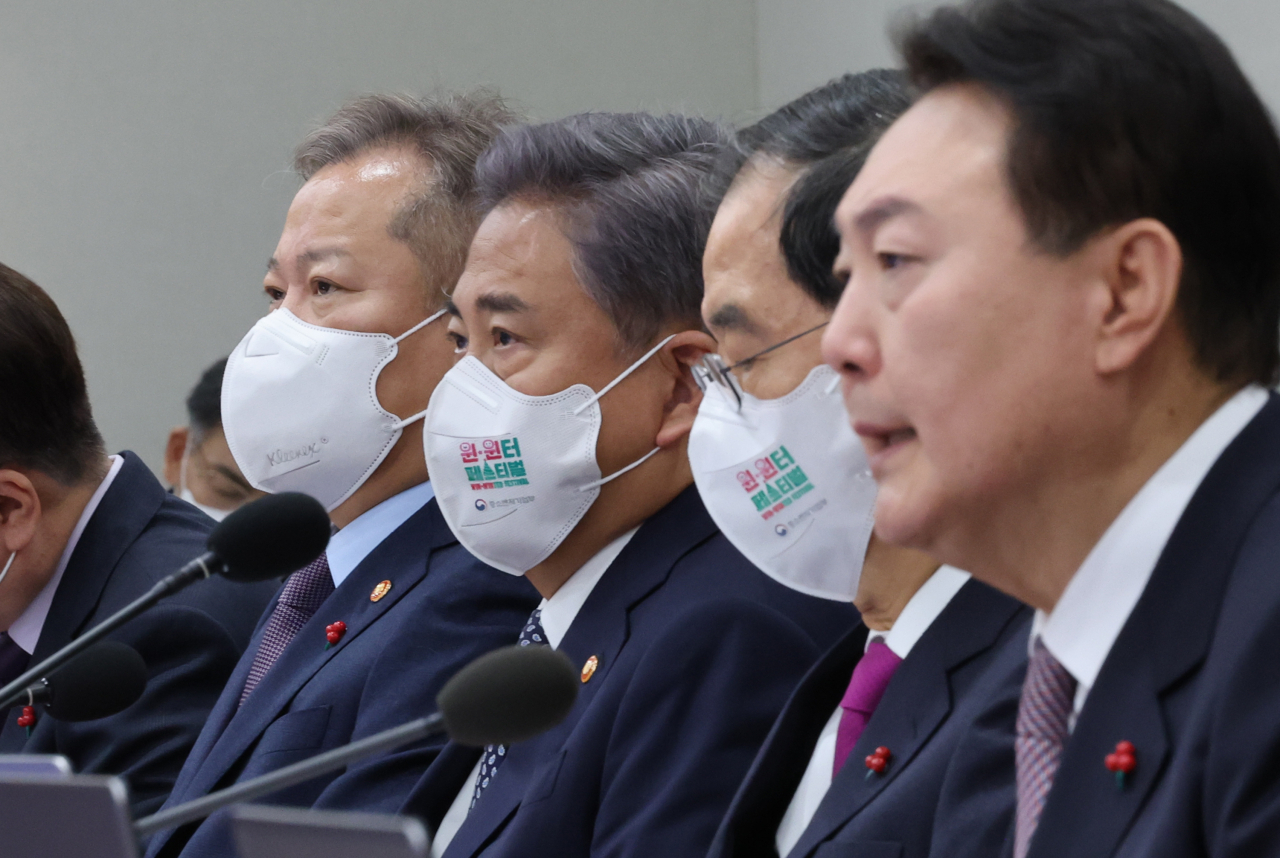 |
President Yoon Suk-yeol speaks at the Cabinet meeting at the presidential office in Seoul on Dec. 13. (Yonhap) |
The Yoon Suk-yeol government and ruling People Power Party said Monday they will focus on an economic goal of reaching a GDP of $40,000 per capita by 2027, the president's final year.
The party’s policy committee leader Sung Il-jong said in a press briefing that the government and the ruling party agreed to “focus the most on economic management” starting next year with the vision of opening an era of “$40,000 in GDP per capita in 2027.”
The goal of $40,000 in gross domestic product per capita has been a policy target of former presidents for nearly 15 years, including Moon Jae-in, Park Geun-hye and Lee Myung-bak. Korea's GDP per capita this year was predicted to be $33,590, according to the World Economic Outlook released by the International Monetary Fund in October.
During the policy meeting, Sung asked the government to focus on restoring private vitality, such as exports and investment through “bold incentives and regulatory innovations,” and also to focus on the government’s economic management plan to make the current account surplus with “strong export drive policies.”
The party also asked the government to “make efforts to lower the burden of prices and living expenses” and to actively “expand the job safety net,” and requested intensive fostering of new growth engines so that the Korean economy can take off again after the crisis.
The Yoon administration, which suffered from unusually low approval ratings in its early presidency, has sought to solidify rising trends of the ratings with this new economic direction as well as through major reform plans and tough stance on the labor strike.
It is the first time in 24 weeks that Yoon’s positive assessment in the Realmeter survey reached above 40 percent, since 44.4 percent in the fifth week in June. Yoon took office on May 10.
After falling below 40 percent in the first week of July, Yoon's positive evaluation has been on the rise since the third week of November, apparently due to Yoon's strict response to the truckers' strike that began on Nov. 24.
A tough stance on labor strikes often raised government approval ratings by garnering supporters of conservatives, according to Bae Jong-chan, political consultant and president of Insight K, citing cases of former British Prime Minister Margaret Thatcher and former US President Ronald Reagan’s firm response to coal mining and steel union strike and pilot strike, respectively.
According to a survey conducted between Dec. 12 and Dec. 16 by Realmeter at the request of the Media Tribune, Yoon’s upbeat assessment of state affairs rose 2.7 percentage points to 41.1 percent and negative evaluation fell 2 percentage points to 56.8 percent.
Realmeter saw that the rise in approval ratings was led by center-leaning respondents, whose favorable ratings rose by 5.5 percentage points, and those in their 20s, which rose by 9.5 percentage points.
Bae Cheol-ho, a senior expert on Realmeter, analyzed the Yoon administration’s criticism on Moon Jae-in Care and reforms in the labor, pension and education sectors as leading to the approval rate surge last week.
Last week, Yoon pledged to reform the nation's health insurance system maintained by the previous Moon Jae-in government, calling it a populist policy that should be eradicated. He also vowed to push ahead with reform measures for the job market, state pension and education, saying he would do so if ever he is not popular.






![[Today’s K-pop] Blackpink’s Jennie, Lisa invited to Coachella as solo acts](http://res.heraldm.com/phpwas/restmb_idxmake.php?idx=644&simg=/content/image/2024/11/21/20241121050099_0.jpg)
